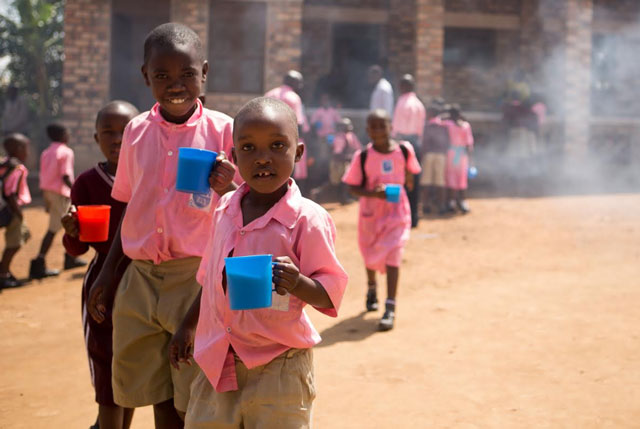
Kampala, Uganda | DORAH EGUNYU | Up to eight million children attend primary school in Uganda according to the Uganda National Planning Authority Report of 2017. Of these, 5.2 million (66%) attend school on empty stomachs.
Children leave home very early and often with no breakfast and study all day on empty stomachs. Children experience short term hunger which leads to poor concentration in class and often spend the greater part of their afternoon looking for fruits to eat which accounts for increased absenteeism in schools particularly in the afternoon.
For the last two and a half years, SNV Uganda through its dairy project – TIDE (The Inclusive Dairy Enterprise Project) – has been working with stakeholders to change this trend and get parents to provide milk for their children to drink while in school through its flagship school milk programme.
Despite the significant hurdles that come with getting parents to contribute to any kind of school feeding initiative, the SNV dairy project has achieved significant mileage with 200,000 school children now drinking milk which is solely funded through parents’ contributions.
The genesis of this meteoric achievement started with the launch of the TIDE project (in South Western Uganda in the cattle corridor districts of Kiruhura, Mbarara, Sheema, Isingiro, Bushenyi, Ntungamo and Lyantonde.
Having witnessed the high malnutrition rates in the region (stunting in the region is at 42%), SNV through the TIDE project launched the school milk programme to improve the nutrition status of primary school going children through promotion of consumption of milk in schools, since milk is readily available in the region.
The school milk programme was launched in August 2016 with SNV’s initial goal being to get parents to contribute towards providing milk for at least 5,000 of their children while in school.
The initiative however soon became a national pilot with the Ministries of: Education and Sports, Health partnering with SNV to implement the national school feeding guidelines through the SNV School milk programme.
By the end of 2016, 35,000 children in 77 schools were having parent-provided milk while in school. The programme has now been embraced by parents in 627 schools in the seven target districts with 200,000 children (68% of the total primary school enrolment in the seven districts) consuming milk while at school.
Parents agree to contribute sh20,000
What is critical to note is that the programme is being championed by parents who are contributing on average sh20,000 per term to enable their children take milk which is mixed with porridge.
“We want to thank SNV for leading the path in championing for parent led school feeding, which path the rest of us will follow to get quality education,” said Ismael Mulindwa, Acting Director Basic and Secondary Education during his key note address at the opening of the regional learning forum on school milk in Mbarara recently.
Mulindwa, who is also Ministry of Education and Sports Chairperson Multi-stakeholder working group on Parent Led school feeding, hailed the SNV programe for putting parents at the centre of the nutition programme. ” SNV’s school milk and nutrition project in South Western Uganda is one of our treasured models in school feeding and nutrition because it puts parents at the centre of the interventions (parent – led) which is more sustainable in the long run,” he said.
His remarks were reiterated by both the technical and political representatives of government from the districts represented at the learning forum as well as the Deputy Ambassador, Netherlands Embassy Kampala who pledged to support Government’s efforts to develop the agriculture sector.
“The reason why EKN through the SNV TIDE project is involved in the school milk project is to help dairy farmers improve their productivity and unlock their potential and ultimately improve the entire dairy value chain. Increased productivity and farming is about business and improving household nutrition,” Joris van Bommel, Deputy Head of Mission and Head of Cooperation Netherlands Embassy Kampala.
Pro-biotic yoghurt is next
The School milk programme is anchored on public private sector engagement to promote milk consumption as part of the daily school meals.
Parents are sensitised about the benefits of the school milk programme and encouraged to contribute money towards the purchase of milk for their children to take during break time. It is the parents’ sole responsibility to mobilize funds to buy milk and other consumables like firewood to boil the milk.
The SNV TIDE project supported the schools with 50% subsidy to cover the cost of purchasing improved cooking stoves and saucepans and installing water filters so that children could have safe drinking water at school.
SNV is now working with Yoba for life to introduce pro-biotic yoghurt in nursery schools within the 7 districts.
The yoghurt which is made with pro-biotic starter culture (naturally occurring bacteria that is present in the body that helps the body fight bacteria) is particularly beneficial for young children as it helps boost their immunity.
The project which began in March 2018 has so far been embraced by parents in 59 nursery schools with 6,000 children drinking yoghurt twice a week in school.
The yoghurt is supplied by women groups who have been taught how to make probiotic yoghurt and each parent contributes sh12,000 per term for their children to take 125ml of yoghurt twice a week.
While the uptake of the School Milk Programme has been embraced by parents, the programme has not yet achieved 100% school feeding in the schools. On average 30% of the children in the schools are still not having parent provided school meals.
The TIDE project manager Rinus has urged stakeholders to continue the discussion so that school feeding becomes a community concern and solutions developed to support the remaining parents to get on board and contribute towards the school feeding programme.
*******
SOURCE: SNV Uganda
 The Independent Uganda: You get the Truth we Pay the Price
The Independent Uganda: You get the Truth we Pay the Price





